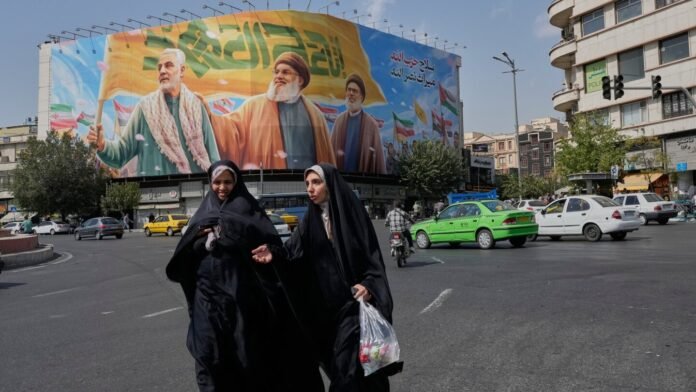DUBAI, United Arab Emirates (news agencies) — The United Nations reimposed sanctions on Iran early Sunday over its nuclear program, further squeezing the Islamic Republic as its people increasingly find themselves priced out of the food they need to survive and worried about their futures.
The sanctions will again freeze Iranian assets abroad, halt arms deals with Tehran, and penalize any development of Iran’s ballistic missile program, among other measures. It came via a mechanism known as “snapback,” included in Iran’s 2015 nuclear deal with world powers, and comes as Iran’s economy already is reeling.
Iran’s rial currency sits at a record low, increasing pressure on food prices and making daily life that much more challenging. That includes meat, rice and other staples of the Iranian dinner table.
Meanwhile, people worry about a new round of fighting between Iran and Israel — as well as potentially the United States — as missile sites struck during the 12-day war in June now appear to be being rebuilt.
Activists fear a rising wave of repression within the Islamic Republic, which already has reportedly executed more people this year than over the past three decades.
Sina, the father of a 12-year-old boy who spoke on condition that only his first name be used for fear of repercussions, said the country has never faced such a challenging time, even during the deprivations of the 1980s Iran-Iraq war and the decades of sanctions that came later.
“For as long as I can remember, we’ve been struggling with economic hardship, and every year it’s worse than the last,” Sina told media. “For my generation, it’s always either too late or too early — our dreams are slipping away.”
Snapback was designed to be veto-proof at the U.N. Security Council, meaning China and Russia could not stop it alone, as they have other proposed actions against Tehran in the past. Russian Foreign Minister Sergey Lavrov called them a “trap” for Iran on Saturday.
France, Germany and the United Kingdom triggered snapback over Iran 30 days ago for its further restricting monitoring of its nuclear program and the deadlock over its negotiations with the U.S.
Iran further withdrew from the International Atomic Energy Agency monitoring after Israel’s war with the country in June, which also saw the U.S. strike nuclear sites in the Islamic Republic. Meanwhile, the country still maintains a stockpile of uranium enriched up to 60% purity — a short, technical step away from weapons-grade levels of 90% — that is largely enough to make several atomic bombs, should Tehran choose to rush toward weaponization.
Iran has long insisted its nuclear program is peaceful, though the West and IAEA say Tehran had an organized weapons program up until 2003.
The three European nations on Sunday said they “continuously made every effort to avoid triggering snapback.” But Iran “has not authorized IAEA inspectors to regain access to Iran’s nuclear sites, nor has it produced and transmitted to the IAEA a report accounting for its stockpile of high-enriched uranium.”
Tehran has further argued that the three European nations shouldn’t be allowed to implement snapback, pointing in part to America’s unilateral withdrawal from the accord in 2018, during the first term of President Donald Trump’s administration.
U.S. Secretary of State Marco Rubio praised the three European nations for “an act of decisive global leadership” for imposing the sanctions on Iran and said “diplomacy is still an option.”
“For that to happen, Iran must accept direct talks,” Rubio said.

